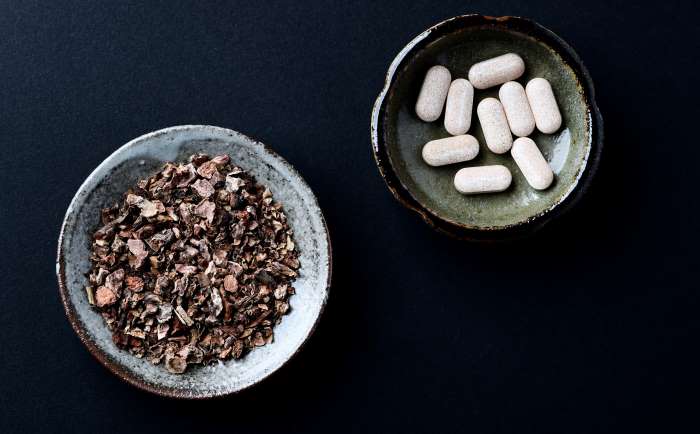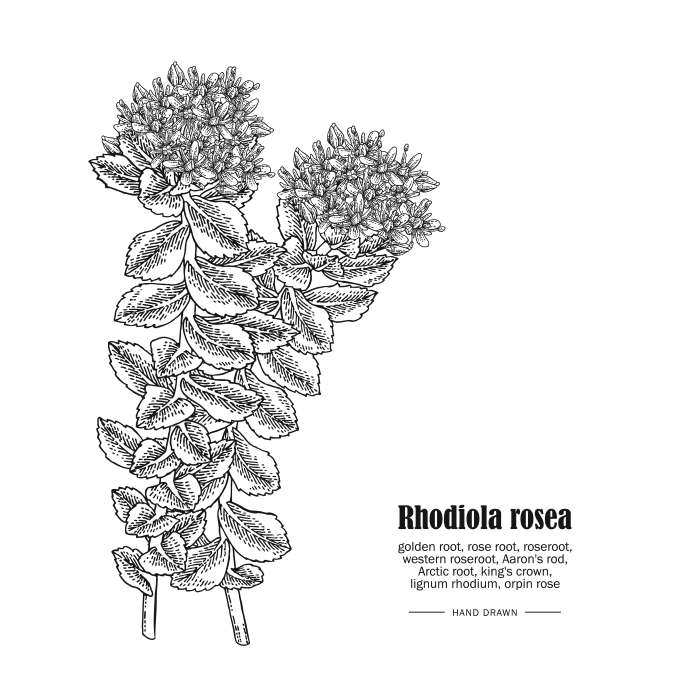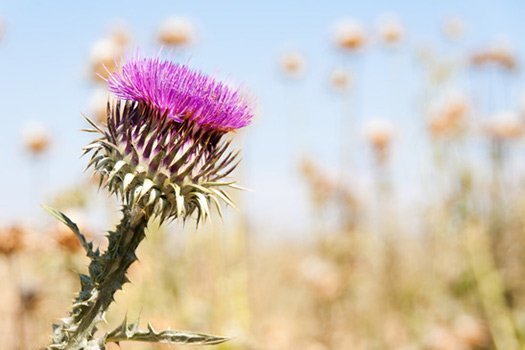If you’re looking for a natural way to improve your skin health, you may have come across Rhodiola rosea. This herb has been used for centuries in traditional medicine to boost energy, reduce stress, and improve overall well-being. In recent years, it has gained popularity as a supplement that may help reduce the signs of aging, including fine lines and wrinkles.

In this article, we’ll explore Rhodiola rosea in more detail, answering common questions about its benefits, side effects, and usage. We’ll also provide tips for using Rhodiola rosea safely and effectively to improve your skin health.
What is Rhodiola Rosea?
Rhodiola rosea is a perennial herb that is native to the arctic regions of Europe and Asia. It is also known by several other names, including golden root, arctic root, and roseroot. For centuries, Rhodiola rosea has been used in traditional medicine to help the body adapt to stress and improve physical and mental performance.
Rhodiola rosea is known for its adaptogenic properties, which means it helps the body adapt to stress and maintain homeostasis. This is believed to be due to the presence of several active compounds, including rosavin, rosarin, and salidroside, which have been shown to have anti-inflammatory and antioxidant effects.
In recent years, Rhodiola rosea has gained popularity as a supplement that may help improve skin health. While research in this area is still limited, some studies suggest that the herb may help reduce the appearance of fine lines and wrinkles, improve skin hydration, and protect against UV-induced damage.
Is Rhodiola Rosea Anti-Aging?
One of the most common claims about Rhodiola rosea is that it has anti-aging properties. While research in this area is still limited, some studies suggest that the herb may help reduce the signs of aging, including fine lines and wrinkles.
One study published in the journal “Clinical Interventions in Aging” found that a supplement containing Rhodiola rosea, along with other antioxidants and vitamins, was effective at reducing the appearance of fine lines and wrinkles in women aged 40 to 70. Another study published in the “Journal of Cosmetic Dermatology” found that a topical cream containing Rhodiola rosea extract helped improve skin hydration and reduce the appearance of wrinkles.
These findings suggest that Rhodiola rosea may have potential as an anti-aging supplement. However, it’s important to note that the research in this area is still limited and more studies are needed to fully understand the herb’s effects on skin health.
In addition to its potential anti-aging benefits, Rhodiola rosea may also help protect against UV-induced damage, which can contribute to premature aging. One study published in the “Journal of Ethnopharmacology” found that Rhodiola rosea extract helped protect skin cells against UV-induced damage and reduce inflammation.
Overall, while more research is needed, the current evidence suggests that Rhodiola rosea may have potential as an anti-aging supplement. If you’re interested in using Rhodiola rosea for skin health, be sure to choose a high-quality supplement and follow dosage recommendations carefully.
What Can You Not Mix with Rhodiola?
Rhodiola rosea is generally considered safe when used as directed. However, there are some potential interactions and side effects to be aware of, particularly when combining Rhodiola rosea with certain medications or supplements.
For example, Rhodiola rosea may interact with medications that affect the central nervous system, including antidepressants, sedatives, and stimulants. This is because Rhodiola rosea may also affect the central nervous system, and combining it with these medications may increase the risk of side effects such as dizziness, drowsiness, and confusion.
In addition, Rhodiola rosea may interact with certain supplements, including those that affect blood sugar levels or blood pressure. If you have diabetes or high blood pressure, it’s important to talk to your doctor before using Rhodiola rosea to avoid any potential interactions.
While the potential interactions and side effects of Rhodiola rosea are generally mild, it’s always a good idea to talk to your doctor before starting any new supplement or medication. Your doctor can help you determine if Rhodiola rosea is right for you, and provide guidance on how to use it safely and effectively.
Which is Better, Ashwagandha or Rhodiola Rosea?
Ashwagandha and Rhodiola rosea are both popular adaptogenic herbs that have been used for centuries to promote overall health and wellness. While both herbs share some similarities, they also have some key differences.
One of the main differences between the two herbs is their specific effects on the body. Ashwagandha is known for its calming and relaxing effects, while Rhodiola rosea is often used to promote energy and mental clarity. As a result, the two herbs may be better suited for different purposes.
For example, if you’re looking to reduce stress and anxiety, ashwagandha may be a better choice. Studies have shown that ashwagandha can help reduce cortisol levels, which is a hormone that is released in response to stress. This can help promote feelings of calm and relaxation.
On the other hand, if you’re looking to improve cognitive function or physical performance, Rhodiola rosea may be a better choice. Rhodiola rosea has been shown to increase mental clarity and physical endurance, making it a popular choice for athletes and students.
How Long Does it Take for Rhodiola to Start Working?
The time it takes for Rhodiola rosea to start working may vary depending on a number of factors, including the individual’s body chemistry, the dose of Rhodiola rosea, and the specific benefits being sought.
Some people report feeling the effects of Rhodiola rosea within hours of taking it, while others may take several weeks to experience the benefits. This is because Rhodiola rosea may work differently for different people, and some may need more time to build up in the body before the effects are felt.
In general, Rhodiola rosea is thought to have a cumulative effect, meaning that the longer it is used, the greater the potential benefits may be. For this reason, it’s recommended to take Rhodiola rosea regularly over a period of weeks or months to see the best results.
It’s important to note that Rhodiola rosea is not a quick fix or a magic bullet for any specific health issue. Rather, it is a natural supplement that may provide a range of potential benefits when used over time as part of a healthy lifestyle.
Is it Okay to Take Rhodiola Every Day?
Rhodiola rosea is generally considered safe for most people when taken as directed. While there is no standard recommended dose for Rhodiola rosea, most studies have used doses of between 200-600 mg per day, taken in one or two divided doses.
Some people may experience mild side effects when taking Rhodiola rosea, such as dry mouth, dizziness, or headaches. However, these side effects are usually temporary and subside on their own.
Because Rhodiola rosea is an adaptogen, it is generally considered safe to take on a daily basis for extended periods of time. In fact, many people find that the longer they take Rhodiola rosea, the greater the benefits they experience. However, as with any supplement, it’s always a good idea to talk to your doctor before starting to take Rhodiola rosea on a daily basis, especially if you have any underlying health conditions or take any medications.
It’s also important to note that Rhodiola rosea is not a substitute for a healthy lifestyle. While Rhodiola rosea may provide a range of potential benefits, including stress reduction, increased energy, and improved cognitive function, it is not a replacement for a well-balanced diet, regular exercise, and other healthy habits. By incorporating Rhodiola rosea into a healthy lifestyle, you may be able to enhance your overall health and well-being over time.
Side Effects of Rhodiola Rosea
Rhodiola rosea is generally considered safe for most people when taken as directed. However, like any supplement or medication, it can cause side effects in some individuals.
The most common side effects of Rhodiola rosea are generally mild and temporary, and may include dry mouth, dizziness, or headaches. These side effects usually go away on their own after a few days of taking the supplement.
In rare cases, some people may experience more serious side effects from taking Rhodiola rosea. These may include gastrointestinal upset, allergic reactions, or changes in blood pressure. If you experience any of these symptoms while taking Rhodiola rosea, you should stop taking the supplement and seek medical attention right away.
It’s also important to note that Rhodiola rosea may interact with certain medications, including antidepressants, blood thinners, and stimulants. If you are taking any medications, it’s important to talk to your doctor before starting to take Rhodiola rosea to ensure that it does not interact with any other medications you may be taking.
Finally, it’s important to purchase Rhodiola rosea from a reputable source to ensure that you are getting a high-quality supplement that has been tested for purity and potency. By following these guidelines, you can minimize your risk of experiencing any negative side effects from taking Rhodiola rosea, and enjoy its potential benefits for your skin health and overall well-being.

Further reading on Rhodiola Rosea:
Rhodiola rosea for physical and mental fatigue
https://fullscript.com/blog/rhodiola-rosea

